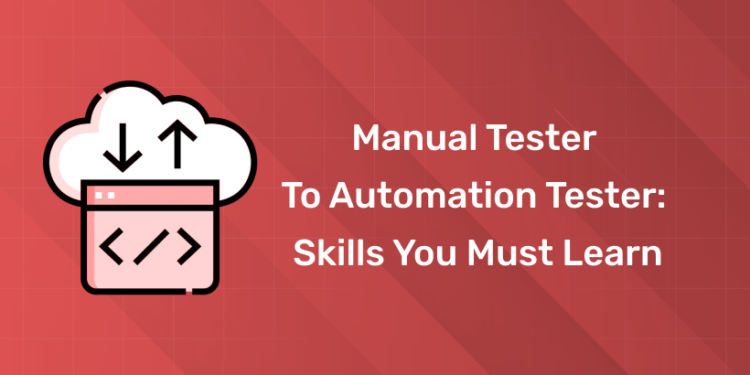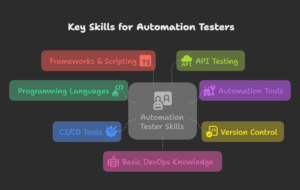Table of Contents
Introduction
Manual testing is the process of hand-testing software in order to identify defects. Testers navigate through the apps, enter data, and check outputs. It is important but also does so slowly and repetitively. Alternatively, automation testing relies on scripts and tools to execute tests quickly and more accurately. As software is now released at a fast pace, companies require automation testers. Shifting to automation testing will catapult your career into more and exciting jobs with higher pay. Why continue doing manual testing when you can automate your tomorrow?
Think of the ability to catch bugs in seconds instead of hours, Think of being the reference person for the coolest projects. This is the strength of becoming an automation tester. Using Entri’s courses as a stepping stone, this guide provides manual testers with practical skills and steps to make the leap.
Learn Software Testing from QA Experts! Get Free Demo Classes Here!
Why Manual Testers Should Move to Automation
1: What is software testing?
Automation testers are in demand in the job market. Automated processes are what provide that ability to deliver software to businesses quickly and dependably. Automation testers usually get paid 20-30% more than manual testers and in the U.S, salary amounts are usually over $80K per year. Automated tests help to create a time economy for hardware testing, allowing testers to spend more time on difficult and complex issues rather than repeating tests.
The trend in the industry is to automate it. CI/CD pipelines require fast and reliable testing. DevOps teams use automation to keep pace with rapid changes in code. Automation is a good solution as agile projects require testers that can adapt quickly. Non-upgrading manual testers could be at a loss in a world increasingly reliant on technology. You can be ahead with job-oriented skills by taking up Entri’s automation testing courses.
Master Testing Skills with Industry Experts
Become a Test Engineer: Learn Core Skills from Industry-Leading Mentors and Land High-Paying Testing Jobs!
Explore ProgramKey Skills Manual Testers Need to Learn
Becoming an automation tester requires specific skills. These bridge the gap from manual to automation testing.
a. Programming Languages
Automation testers must code. Python, Java, and JavaScript are top picks. Python is easy to learn and powers tools like Selenium. Java is great for enterprise apps and pairs with TestNG. JavaScript shines for web testing with tools like Cypress. Start with one language and practice daily to write clean scripts. Entri’s Python for Automation course offers step-by-step lessons to build your coding skills from scratch.
b. Automation Tools
Tools drive automation testing. Selenium WebDriver is essential for web apps, supporting multiple languages and browsers. Cypress is fast and ideal for JavaScript projects. Playwright handles complex web apps across browsers. TestNG and JUnit organize tests and generate reports. Begin with Selenium, then explore others. Entri’s Selenium WebDriver course provides hands-on projects to master these tools.
c. Version Control
Git is crucial for managing test scripts. It tracks changes, supports teamwork, and integrates with CI/CD tools. Learn commands like clone, commit, push, and pull. Understand branching for collaboration. GitHub is a great platform to practice. Entri’s Git for Testers course teaches you how to use version control effectively.
d. CI/CD Tools
Automation testers work in CI/CD environments. Jenkins automates test runs in pipelines. GitHub Actions simplifies CI/CD for beginners. These tools trigger tests when code changes. Learn to set up jobs and read results. Entri’s CI/CD for Testing course covers Jenkins and GitHub Actions with real-world examples.
e. Frameworks & Scripting
Test automation frameworks make scripts efficient. Page Object Model (POM) organizes tests for reusability. Behavior-Driven Development (BDD) uses tools like Cucumber for clear tests. Test-Driven Development (TDD) writes tests before code. Start with POM, as it’s widely used. Entri’s Test Automation Frameworks course helps you build robust scripts.
f. API Testing
API testing checks backend systems. Postman simplifies sending requests and verifying responses. REST Assured works with Java for automated API tests. Learn to test endpoints and handle JSON/XML data. API testing is a hot skill in software projects. Entri’s API Testing course offers practical training with Postman.
g. Basic DevOps Knowledge
DevOps skills boost automation testing. Docker creates consistent test environments with containers. Cloud platforms like AWS host testing setups. Learn Docker basics to run isolated tests. Understand cloud concepts for scalability. Entri’s DevOps Basics for Testers course introduces these concepts with simple examples.
Soft Skills That Make a Difference
Technical skills aren’t enough. Automation testers need soft skills to stand out.
-
Problem-Solving Mindset: Debug scripts, analyze failures, and find solutions. Practice breaking problems into small steps.
-
Communication with Developers: Explain bugs clearly without jargon. Work well in Agile teams.
-
Adaptability in Changing Tech: Tools and processes shift fast. Stay open to learning new methods.
Entri’s soft skills workshops help testers build these abilities through real-world scenarios.
Step-by-Step Plan to Transition
Switching to automation testing needs a clear roadmap. Follow these steps to succeed.
-
Upskilling Schedule:
-
Months 1-2: Learn Python or Java (1-2 hours daily). Use Entri’s coding courses.
-
Months 3-4: Master Selenium WebDriver. Build test scripts with Entri’s Selenium course.
-
Month 5: Learn Git and GitHub. Practice with Entri’s Git course.
-
Month 6: Explore CI/CD with Jenkins or GitHub Actions. Try Entri’s CI/CD course.
-
Months 7-8: Study frameworks like POM. Use Entri’s framework course.
-
Month 9: Learn API testing with Postman. Enroll in Entri’s API course.
-
Months 10-12: Experiment with Docker and cloud basics. Build a portfolio with Entri’s guidance.
-
-
Hands-On Project Ideas:
-
Automate login tests for a website using Selenium.
-
Create a test suite for an e-commerce checkout process.
-
Set up a CI/CD pipeline with GitHub Actions.
-
Test a public API like OpenWeatherMap with Postman.
-
Build a POM-based framework for a sample app.
-
-
Certifications:
-
ISTQB Advanced Level Test Automation Engineer: Covers automation basics.
-
Entri’s Selenium WebDriver Certification: Hands-on Selenium training.
-
Entri’s Automation Testing Certification: Combines tools, frameworks, and CI/CD.
-
Learn Software Testing from QA Experts! Get Free Demo Classes Here!
Master Testing Skills with Industry Experts
Become a Test Engineer: Learn Core Skills from Industry-Leading Mentors and Land High-Paying Testing Jobs!
Explore ProgramCommon Mistakes to Avoid
The transition can be tricky. Steer clear of these errors.
-
Overusing Record/Playback Tools: Tools like Selenium IDE are quick but rigid. Learn to write custom scripts for flexibility.
-
Skipping Coding Basics: Ignoring loops, conditions, and functions leads to weak scripts. Master programming first.
-
Rushing to Tools: Using Selenium without coding skills causes frustration. Build a solid foundation.
Entri’s structured courses ensure you avoid these pitfalls with guided learning.
Resources to Master Automation Testing
Entri offers top-notch resources to turn manual testers into automation experts.
-
Entri’s Automation Testing Courses:
-
Python for Automation: Beginner-friendly coding lessons.
-
Selenium WebDriver Masterclass: Hands-on projects for web testing.
-
API Testing with Postman: Practical API testing skills.
-
CI/CD for Testers: Learn Jenkins and GitHub Actions.
-
Test Automation Frameworks: Build POM and BDD frameworks.
-
-
GitHub Repositories:
-
Explore Entri’s GitHub for sample test scripts and projects.
-
Check public repos like SeleniumHQ/selenium for examples.
-
-
Communities:
-
Join Entri’s learner community for support and networking.
-
Engage on Stack Overflow or Reddit’s r/QualityAssurance for tips.
-
Entri’s courses are designed for real-world skills, with mentors to guide you.
Learn Software Testing from QA Experts! Get Free Demo Classes Here!
Conclusion
Manual testers can unlock a brighter future as automation testers. Skills like coding, tools, and DevOps lead to better jobs and higher pay. The tech world demands speed and precision, and automation delivers. Start today: learn with Entri’s courses, build projects, and earn certifications. Avoid mistakes like skipping coding basics or relying on shortcuts. Entri’s hands-on training makes the transition smooth and achievable. Take the first step now—your dream career as an automation tester awaits!
Frequently Asked Questions
What is the main difference between manual testing and automation testing, and why should I switch?
Manual testing involves checking software by hand, clicking through interfaces, entering data, and verifying results. It’s thorough but time-consuming and repetitive. Automation testing uses scripts and tools to run tests quickly and repeatedly, reducing errors and saving time. For example, a manual tester might spend hours testing a login page, while an automation tester can write a script to test it in minutes.
Switching to automation is a smart move because companies now prioritize speed and efficiency. Automation testers are in high demand, with salaries often 20-30% higher than manual testers, averaging $80,000+ annually in the U.S. Automation aligns with modern practices like CI/CD and DevOps, making you a key player in fast-moving teams. Entri’s Automation Testing Masterclass helps you learn these skills with hands-on projects, guiding you from manual to automation testing smoothly.
How long does it take to transition from manual to automation testing?
The transition timeline depends on your dedication and starting point, but a realistic plan spans 6-12 months. If you’re new to coding, expect to spend 1-2 months learning a language like Python (1-2 hours daily). Next, 2-3 months mastering tools like Selenium WebDriver, followed by 1-2 months on Git and CI/CD tools like Jenkins. Learning frameworks and API testing takes another 2-3 months. Finally, 1-2 months on DevOps basics like Docker completes the journey.
With consistent effort, you can start automating basic tests within 6 months and handle complex projects by the year’s end. Entri’s structured courses, like the Python for Automation and Selenium WebDriver Masterclass, provide a clear roadmap with practical exercises, helping you stay on track and build a portfolio to showcase your skills.
Do I need to be an expert coder to become an automation tester?
No, you don’t need to be an expert coder, but basic programming skills are essential. Automation testers write scripts to automate tasks, so learning a language like Python, Java, or JavaScript is a must. Start with basics like variables, loops, and functions, which are enough to create simple test scripts. For example, a Python script to test a login form might use loops to try multiple credentials, saving hours of manual work.
As you grow, you’ll learn advanced coding for frameworks and APIs. The key is consistent practice, not perfection. Entri’s Python for Automation course is beginner-friendly, breaking down coding concepts into bite-sized lessons with real-world examples, making it easy for manual testers to start coding confidently.
Which automation tools should I learn first, and why are they important?
Start with Selenium WebDriver, the most widely used tool for automating web applications. It supports multiple languages (Python, Java) and browsers, making it versatile for real-world projects. For example, Selenium can automate testing a website’s search feature across Chrome and Firefox. Next, explore Cypress for JavaScript-based apps or Playwright for modern web testing. TestNG or JUnit are great for organizing tests and generating reports.
These tools are critical because they speed up testing and ensure consistency. Companies rely on them to catch bugs before release, saving time and costs. Entri’s Selenium WebDriver course offers hands-on projects, like automating an e-commerce checkout, to help you master these tools and stand out to employers.
Why is learning version control like Git important for automation testers?
Git is a version control system that tracks changes to your test scripts, making collaboration and updates easier. As an automation tester, you’ll work in teams, sharing scripts with developers or other testers. Git lets you save versions, revert mistakes, and merge changes without conflicts. For example, if you update a login test script, Git ensures your team can review and integrate it smoothly.
Learning commands like clone, commit, and push is enough to start. Git also integrates with CI/CD tools like Jenkins, automating test runs. Entri’s Git for Testers course teaches you these skills with practical exercises, like managing a test script repository, ensuring you’re ready for team projects.
How does API testing fit into automation testing, and what tools should I use?
API testing checks the backend systems that power apps, ensuring data and functions work correctly. Unlike manual testing, which focuses on the user interface, API testing verifies communication between servers and apps. For instance, testing an e-commerce API ensures the “add to cart” feature sends correct data. Automation testers use tools like Postman to send requests and check responses manually, or REST Assured for automated API tests with Java.
API testing is in demand because modern apps rely heavily on APIs. Learning it makes you versatile. Entri’s API Testing course covers Postman and REST Assured with real-world projects, like testing a weather API, helping you add this high-value skill to your toolkit.
What role does DevOps play in automation testing, and what should I learn?
DevOps focuses on collaboration and automation in software development, and automation testers are key players. Tools like Docker create consistent test environments using containers, ensuring tests run the same everywhere. For example, a Docker container can mimic a production server for accurate testing. Cloud platforms like AWS host these environments for scalability. CI/CD tools like Jenkins automate test runs when code changes, speeding up releases.
Learn Docker basics to set up containers and understand cloud concepts for testing in AWS. These skills align you with DevOps teams. Entri’s DevOps Basics for Testers course introduces Docker and CI/CD with simple, hands-on projects, making you a valuable team member.
What soft skills are critical for automation testers, and how can I improve them?
Automation testers need more than technical skills. A problem-solving mindset helps debug scripts and fix test failures. For example, if a test fails due to a timing issue, you’ll need to analyze and adjust the script. Communication is key when reporting bugs to developers or discussing requirements in Agile teams. Adaptability keeps you relevant as tools and processes change rapidly.
Improve these skills through practice. Solve coding challenges on platforms like HackerRank. Practice explaining technical issues in simple terms. Stay open to new tools by experimenting with small projects. Entri’s soft skills workshops offer role-playing scenarios, like collaborating with developers, to build these abilities effectively.
What are the best projects to practice automation testing skills?
Hands-on projects build confidence and prove your skills to employers. Try these:
- Login Automation: Use Selenium to automate login tests for a public website like a demo e-commerce site.
- E-commerce Testing: Create a test suite for a checkout process, verifying cart updates and payments.
- CI/CD Pipeline: Set up GitHub Actions to run automated tests when code changes.
- API Testing: Test a public API like OpenWeatherMap using Postman to validate responses.
- Framework Building: Develop a Page Object Model framework for a sample app to organize tests.
These projects showcase your ability to handle real-world tasks. Entri’s Automation Testing Masterclass includes guided projects like these, helping you build a portfolio that impresses hiring managers.
How can Entri’s courses help me become an automation tester, and what makes them unique?
Entri’s courses are designed for manual testers transitioning to automation, offering practical, job-ready skills. The Automation Testing Masterclass covers Python, Selenium, Git, CI/CD, API testing, and frameworks like POM. Each course includes hands-on projects, like automating a login page or testing an API, to build your portfolio. Expert mentors provide feedback, and the platform’s community connects you with other learners for support.
What makes Entri unique is its focus on real-world application. Courses are structured for beginners, with bite-sized lessons and clear examples. You’ll learn at your own pace, with certifications to boost your resume. Entri’s courses ensure you’re not just learning theory but building skills employers value, making your transition to automation testing smooth and successful.













